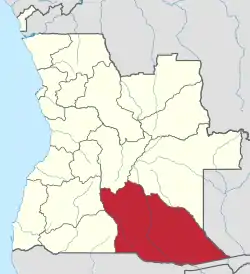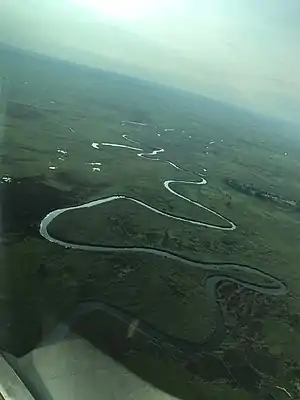Cuando Cubango Province
Cuando Cubango (Umbundu: Kwando Kubango Volupale) is a province of Angola and it has an area of 199,049 km2 and a population of 534,002 in 2014.[1] Menongue is the capital of the province. The governor of the province is Júlio Marcelino Vieira Bessa since July 2019.
Cuando Cubango | |
|---|---|
 Cuando Cubango, province of Angola | |
| Country | Angola |
| Capital | Menongue |
| Government | |
| • Governor | Júlio Marcelino Vieira Bessa |
| • Vice-Governor for the Political, Economic and Social Sector | Sara Luísa Mateus |
| • Vice-Governor for Technical Services and Infrastructures | Bento Francisco Xavier |
| Area | |
| • Total | 199,049 km2 (76,853 sq mi) |
| Population (2014 census)[1] | |
| • Total | 534,002 |
| • Density | 2.7/km2 (6.9/sq mi) |
| ISO 3166 code | AO-CCU |
| HDI (2018) | 0.498[2] low · 16th |
| Website | www |

The name of the province derives from that of the Cuando and Cubango rivers, which flow through the eastern and western edges of the province, respectively.
Geography
Cuando Cubango is traversed by the northwesterly line of equal latitude and longitude. It is located in the extreme south-east of Angola. To the north and north-east it is bordered with Moxico Province, and in the west - the provinces of Huila and Cunene. In the south of Cuando Cubango it borders Namibia, and to the east - Zambia.
Municipalities
The province of Cuando Cubango contains nine (9) municipalities (municípios):
Communes
The province of Cuando Cubango contains the following communes (comunas); sorted by their respective municipalities:
- Calai Municipality – Calai, Maué, Mavengue
- Cuangar Municipality – Caila (Bondo), Cuangar, Savate
- Cuchi Municipality – Chinguanja, Cuchi, Cutato (Kutato), Vissati
- Cuito Cuanavale Municipality – Baixo Longa, Cuito Cuanavale, Longa, Lupire (Lupiri)
- Dirico Municipality – Dirico, Mucusso, Xamavera
- Mavinga Municipality – Cunjamba Dima, Cutuile (Kutuile), Luengue, Mavinga
- Menongue Municipality – Caiundo (Kaiundo), Cueio-Betre, Menongue, Missombo
- Nancova Municipality – Nancova, Rito
- Rivungo Municipality – Chipundo, Jamba-Cueio, Luiana, Mainha Neriquinha, Rivungo
Natural history
Considerable natural habitat previously existed within the province, although much of these areas has been destroyed during the period 1965 to 1991 during the foreign intervention years of the Angolan Civil War.[3][4] In particular, the area was previously suitable habitat for the endangered painted hunting dog, Lycaon pictus, which is now deemed extirpated in the local area.[5]
Jonas Savimbi and UNITA
Throughout much of the 1980s and 1990s, Cuando Cubango served as the location for the primary base camp of Angola's UNITA rebel movement, led by Jonas Savimbi. The rebel movement received support from the United States as part of the Cold War conflict against Angola's Marxist government, which was supported by the Soviet Union, Cuba and other communist states.
Savimbi and UNITA maintained a large and clandestine base camp in the Cubando Cubango town of Jamba. The camp was protected by anti-aircraft weapons and included an air strip, which was used for the delivery of military and other supplies, which typically arrived from neighboring Zaire. The Angolan Civil War ultimately became one of the most prominent conflicts of the Cold War, with both the United States and the Soviet Union depicting its outcome as important to the global balance of power.
List of Governors of Cuando Cubango
| Name | Years in office |
|---|---|
| Mariano Garcia Puku * | (4) 1976–1979 |
| Zacarias Pinto * | (4) 1979–1982 |
| Manuel Francisco Tuta Batalha de Angola * | (9) 1982–1990 |
| Domingos Hungo SKS * | (6) 1990–1995 |
| Manuel Dala | (4) 1995–1998 |
| José Kativa | (2) 1998–1999 |
| Jorge Fernando Biwango | (4) 1999–2002 |
| João Baptista Chindandi | (6) 2003–2008 |
| Eusébio de Brito Teixeira | (5) 2008–2012 |
| Higino Carneiro | (5) 2012–2016 |
| Pedro Mutindi | (3) 2017– |
- Up to 1991, the official name was Provincial Commissioner
References
- Edward George (2005). The cuban intervention in Angola, 1965-1991. Routledge. ISBN 978-0-415-35015-0., 9780415350150 354 pages
- C. Michael Hogan. 2009. Painted Hunting Dog: Lycaon pictus, GlobalTwitcher.com, ed. N. Stromberg
- John Frederick Walker (2004-01-07). A Certain Curve of Horn. Grove Press. ISBN 978-0-8021-4068-5.
Line notes
- "Resultados Definitivos Recenseamento Geral da População e Habitação - 2014" (PDF). Instituto Nacional de Estatística, República de Angola. Retrieved 3 May 2020.
- "Sub-national HDI - Area Database - Global Data Lab". hdi.globaldatalab.org. Retrieved 2020-02-27.
- John Frederick Walker. 2004
- Edward George. 2005
- C. Michael Hogan. 2009
- "Histórico dos Governadores" (in Portuguese). cuandocubango.gov.ao. Retrieved 3 Mar 2019.
External links
- Official website of province governor
- Information on this province at the Angolan ministry for territorial administration
- Information on this province at Info Angola
- Site Official de Kizomba
- United States government population statistics from 1988
- angola.org.uk
- Province geographical info at geoview.info